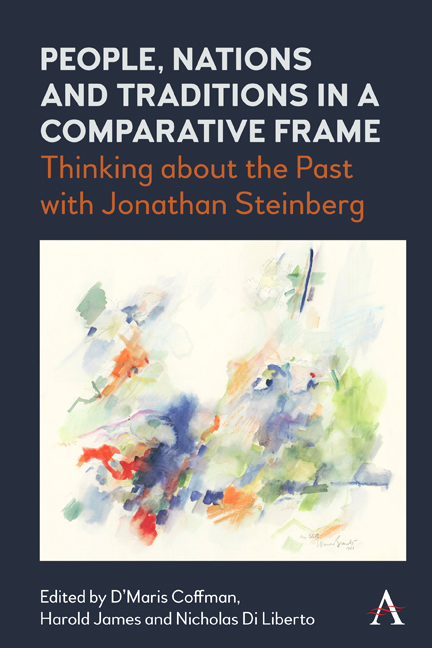 People, Nations and Traditions in a Comparative Frame
People, Nations and Traditions in a Comparative Frame Book contents
- Frontmatter
- Contents
- Foreword
- Acknowledgements
- Notes on Contributors
- Introduction
- Part One Methodological Pluralism and New Applications
- Part Two Personal and National Character
- Part Three Society, Families and the Sovereign Self
- Part Four History Out of Sync: Modernity and Tradition
- Part Five History, Narrative and the Human Condition
- Afterword
- Bibliography of Jonathan Steinberg’s Works
- Index
Chapter Eight - Johnny Eyetie and the Teds: British Soldiers’ Attitudes towards their Italian and German Enemies in the Second World War
Published online by Cambridge University Press: 23 February 2022
- Frontmatter
- Contents
- Foreword
- Acknowledgements
- Notes on Contributors
- Introduction
- Part One Methodological Pluralism and New Applications
- Part Two Personal and National Character
- Part Three Society, Families and the Sovereign Self
- Part Four History Out of Sync: Modernity and Tradition
- Part Five History, Narrative and the Human Condition
- Afterword
- Bibliography of Jonathan Steinberg’s Works
- Index
Summary
Following the fall of Rome in the summer of 1944, as the German forces in central Italy fell back to their prepared defensive lines in the northern Apennines, the British Eighth and US Fifth Armies were able to advance into the vacated regions of Tuscany, Umbria and Marche with what was, by the standard of the campaign up till then, unprecedented swiftness. Each day, forward units of the Anglo-American armies occupied new Italian towns and villages for the first time. One such unit was the 2nd Regiment Royal Horse Artillery, attached to the British 1st Armoured Division. Captain Christopher Seton-Watson, MC, a 26-year-old battery commander with the 2nd RHA who had already taken part in the campaigns in France, Greece and North Africa, was keeping a detailed diary of his experiences. He was struck by how predictable the moment of liberation always was. ‘One sees amusing scenes’, he wrote of the first few hours after the British arrived in a new Italian community:
The main square fills with people, of all ages and classes and sexes; Red Flags are produced, speeches made, the band parades up and down, the local Fascists’ windows are broken (he himself has usually fled), walls are covered with slogans (Viva Matteotti is the favourite) and any English soldier who appears on the scene is carried shoulder high to the nearest cafe and plied with vino […] youths appear in gleaming red shirts and scarves and silly little ‘partisan’ caps like paper hats out of a Christmas cracker, with a star set in the middle of the peak. Long stories are told of heroic deeds in the face of vast German armies. The gullible are persuaded that every mountain in Italy was for three long years covered with Italian soldiers refusing to fight for Musso.
‘What children the Italians are. It's impossible to hate them’, he concluded. And yet, he couldn't help wondering: how many of the beaming, guileless youths now cheering on the Tommies had been enthusiastically parading in black shirts just a few weeks before?
Seton-Watson was an unusually knowledgeable observer of the politics of central Europe.
- Type
- Chapter
- Information
- People, Nations and Traditions in a Comparative FrameThinking about the Past with Jonathan Steinberg, pp. 115 - 128Publisher: Anthem PressPrint publication year: 2021
